18+ Meaning of anti money laundering info
Home » money laundering Info » 18+ Meaning of anti money laundering infoYour Meaning of anti money laundering images are available. Meaning of anti money laundering are a topic that is being searched for and liked by netizens now. You can Find and Download the Meaning of anti money laundering files here. Download all free images.
If you’re searching for meaning of anti money laundering images information related to the meaning of anti money laundering keyword, you have come to the right site. Our site always gives you suggestions for viewing the highest quality video and image content, please kindly hunt and find more enlightening video articles and images that match your interests.
Meaning Of Anti Money Laundering. AML laws require that financial instutions report any financial crime they detect to relevant. 1 Most financial companies have anti-money-laundering AML policies in place to. Anti-money laundering includes all the laws regulations and policies to prevent money laundering and financial crime. Anti-money laundering AML refers to the activities financial institutions perform to achieve compliance with legal requirements to actively monitor for and report suspicious activities.
 Anti Money Laundering Aml Definition From kabarin.co.id
Anti Money Laundering Aml Definition From kabarin.co.id
Apart from this severe sanctions such as the closure of criminal institutions and fines of up to 5 million Euros were imposed. Anti money laundering meaning hindi. Anti-Money Laundering Directive 6AMLD With 6AMLD they will be sentenced to up to four years in prison for money laundering offenses committed by the real population. An incorporated accounting practice AMLCFT means anti-money laundering and countering the financing of terrorism AMLCFT programme means a compliance programme established under section 56 1 AMLCFT requirements means the requirements set out in Part 2. Along with some other aspects of underground economic activity rough estimates have been. Reverse money laundering is a process that disguises a legitimate source of funds that are to be used for illegal purposes.
By its very nature money laundering is an illegal activity carried out by criminals which occurs outside of the normal range of economic and financial statistics.
History of Anti-Money Laundering Laws. Along with some other aspects of underground economic activity rough estimates have been. Anti-Money Laundering Any law or regulation requiring an institution to perform due diligence on potential clients to ensure that it is not aiding in a money laundering scheme. Reverse money laundering is a process that disguises a legitimate source of funds that are to be used for illegal purposes. Anti Money Laundering AML also known as anti-money laundering is the execution of transactions to eventually convert illegally obtained money into legal money. Initially AML laws were implemented only on financial institutions to control drug trafficking.
 Source: kabarin.co.id
Source: kabarin.co.id
Anti-Money Laundering What is Anti-Money Laundering. An incorporated accounting practice AMLCFT means anti-money laundering and countering the financing of terrorism AMLCFT programme means a compliance programme established under section 56 1 AMLCFT requirements means the requirements set out in Part 2. Anti-Money Laundering Any law or regulation requiring an institution to perform due diligence on potential clients to ensure that it is not aiding in a money laundering scheme. Reverse money laundering is a process that disguises a legitimate source of funds that are to be used for illegal purposes. Typically it involves three steps.
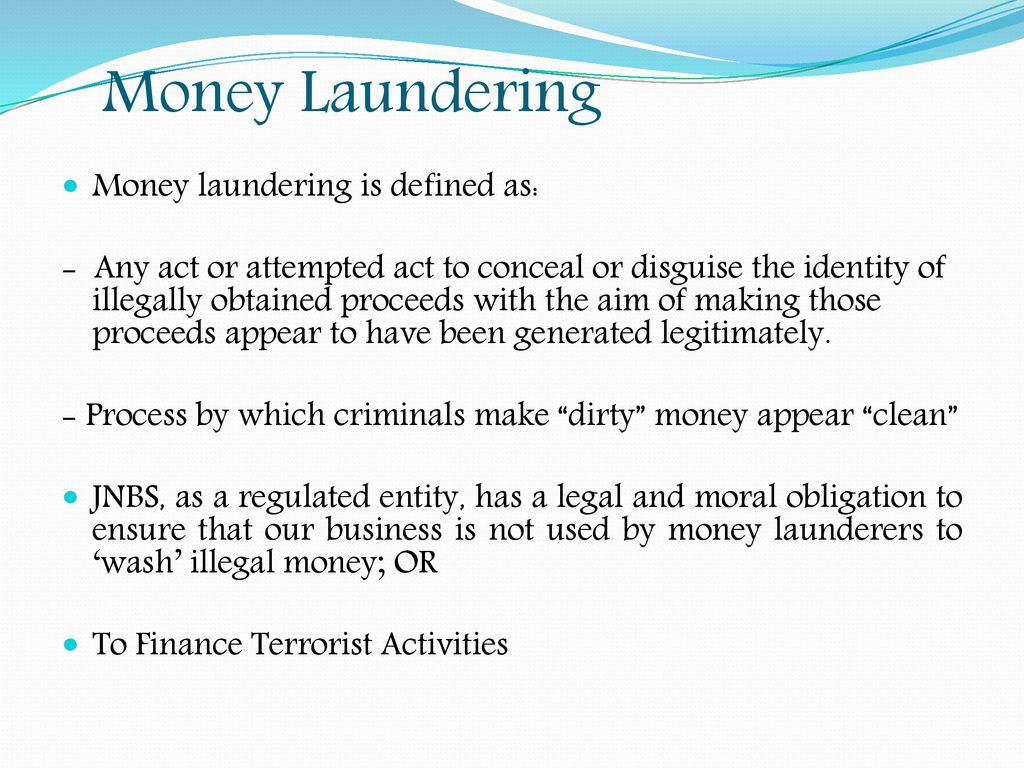 Source: slideplayer.com
Source: slideplayer.com
Anti-Money Laundering Directive 6AMLD With 6AMLD they will be sentenced to up to four years in prison for money laundering offenses committed by the real population. Anti-money laundering AML refers to the activities financial institutions perform to achieve compliance with legal requirements to actively monitor for and report suspicious activities. Reverse money laundering is a process that disguises a legitimate source of funds that are to be used for illegal purposes. If the institution does not conduct due diligence properly it may be held legally liable for the money laundering activities. Money laundering is a serious financial crime that is employed by white collar and street-level criminals alike.
 Source: en.ppt-online.org
Source: en.ppt-online.org
Anti-Money Laundering Laws means the applicable laws or regulations in any jurisdiction in which any Loan Party or any of its Subsidiaries or Affiliates is located or is doing business that relates to money laundering any predicate crime to money laundering or any financial record keeping and reporting requirements related thereto. It is implemented within government systems and large financial institutions to monitor potentially fraudulent activity. History of Anti-Money Laundering Laws. Anti-Money Laundering AML is a set of policies procedures and technologies that prevents money laundering. It is usually perpetrated for the purpose of financing terrorism but can be also used by criminal organizations that have invested in legal businesses and would like to withdraw legitimate funds from official circulation.
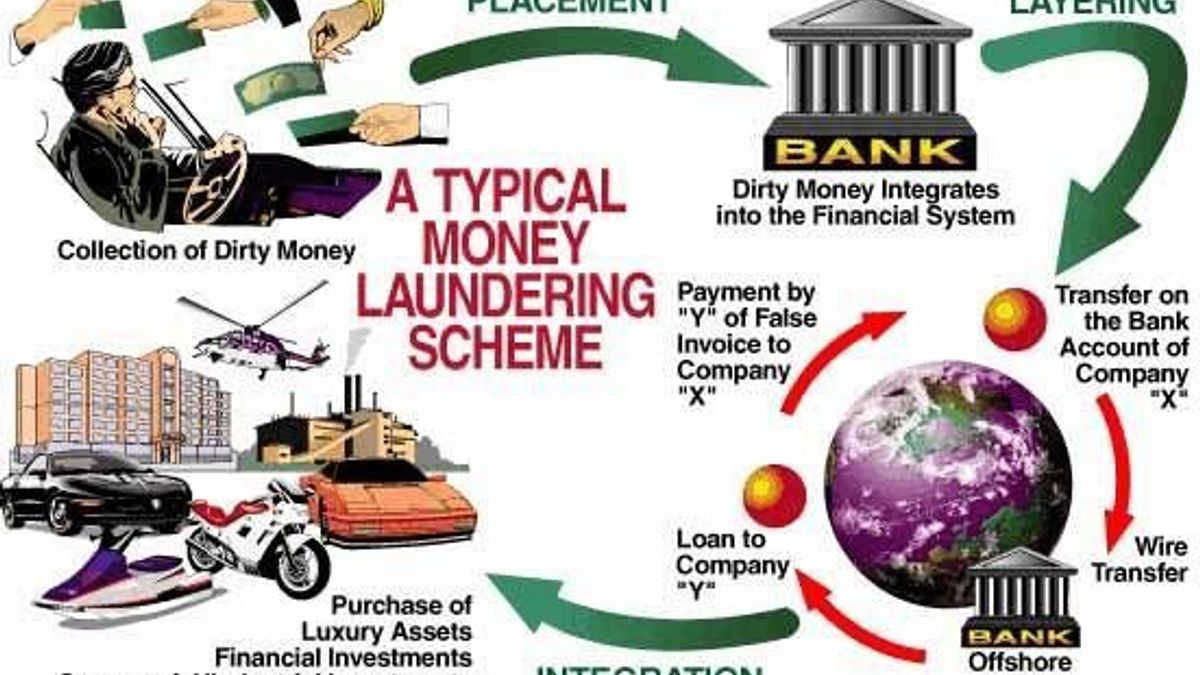 Source: jagranjosh.com
Source: jagranjosh.com
Anti-money laundering AML refers to the activities financial institutions perform to achieve compliance with legal requirements to actively monitor for and report suspicious activities. Money laundering is a serious financial crime that is employed by white collar and street-level criminals alike. If the institution does not conduct due diligence properly it may be held legally liable for the money laundering activities. Money laundering is the process of making illegally-gained proceeds ie. Anti-Money Laundering Directive 6AMLD With 6AMLD they will be sentenced to up to four years in prison for money laundering offenses committed by the real population.
 Source: fuzzylogix.com
Source: fuzzylogix.com
It is usually perpetrated for the purpose of financing terrorism but can be also used by criminal organizations that have invested in legal businesses and would like to withdraw legitimate funds from official circulation. Money laundering is a way to conceal illegally obtained funds. An incorporated accounting practice AMLCFT means anti-money laundering and countering the financing of terrorism AMLCFT programme means a compliance programme established under section 56 1 AMLCFT requirements means the requirements set out in Part 2. Anti-Money Laundering What is Anti-Money Laundering. Placement layering and integration.
 Source: plianced.com
Source: plianced.com
Although you as a company stick to the rules this does not mean that your partners and business associates adhere to the same AML compliance laws as you. Anti-Money Laundering Any law or regulation requiring an institution to perform due diligence on potential clients to ensure that it is not aiding in a money laundering scheme. Reverse money laundering is a process that disguises a legitimate source of funds that are to be used for illegal purposes. Effective anti-money laundering and combating the financing of terrorism regimes are essential to protect the integrity of markets and of the global financial framework as they help mitigate the factors that facilitate financial abuse Min Zhu Deputy Managing Director of the IMF. It is usually perpetrated for the purpose of financing terrorism but can be also used by criminal organizations that have invested in legal businesses and would like to withdraw legitimate funds from official circulation.
 Source: corporatefinanceinstitute.com
Source: corporatefinanceinstitute.com
Anti-money laundering includes all the laws regulations and policies to prevent money laundering and financial crime. Placement layering and integration. Anti money laundering meaning hindi. Typically it involves three steps. Money laundering is the process of making illegally-gained proceeds ie.
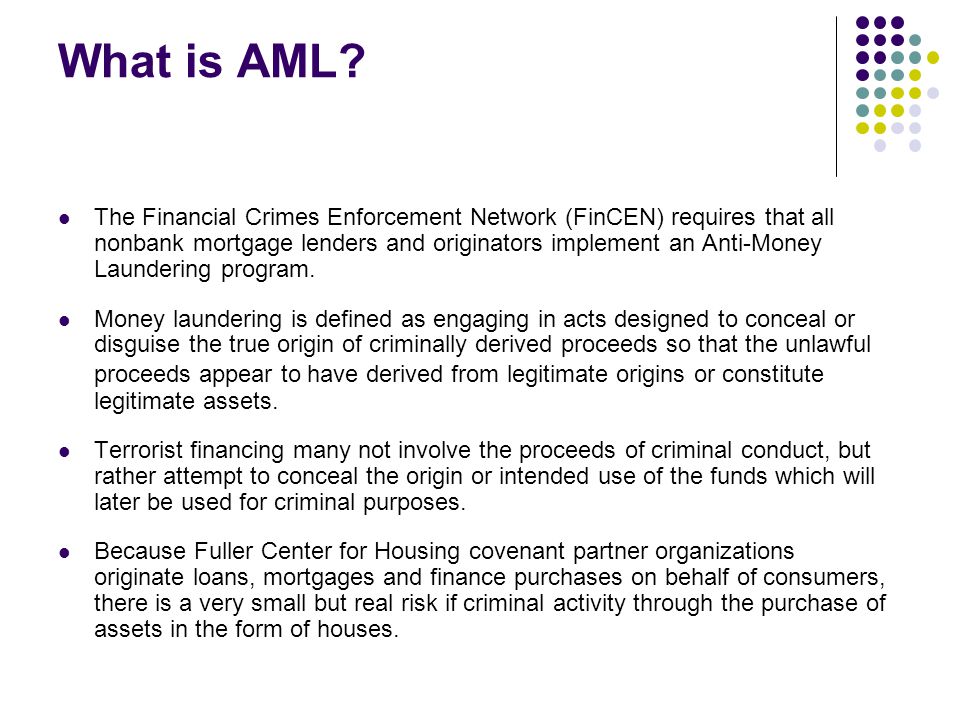 Source: slideplayer.com
Source: slideplayer.com
Along with some other aspects of underground economic activity rough estimates have been. Reverse money laundering is a process that disguises a legitimate source of funds that are to be used for illegal purposes. 1 Most financial companies have anti-money-laundering AML policies in place to. If the institution does not conduct due diligence properly it may be held legally liable for the money laundering activities. It is usually perpetrated for the purpose of financing terrorism but can be also used by criminal organizations that have invested in legal businesses and would like to withdraw legitimate funds from official circulation.
 Source: tookitaki.ai
Source: tookitaki.ai
Anti-money laundering refers to a set of rules and regulations that have been implemented to validate transactions and identification. Criminals use money laundering to conceal their crimes and the money derived from them. An incorporated accounting practice AMLCFT means anti-money laundering and countering the financing of terrorism AMLCFT programme means a compliance programme established under section 56 1 AMLCFT requirements means the requirements set out in Part 2. Anti money laundering meaning hindi. Anti-Money Laundering Laws means the applicable laws or regulations in any jurisdiction in which any Loan Party or any of its Subsidiaries or Affiliates is located or is doing business that relates to money laundering any predicate crime to money laundering or any financial record keeping and reporting requirements related thereto.
Source:
An incorporated accounting practice AMLCFT means anti-money laundering and countering the financing of terrorism AMLCFT programme means a compliance programme established under section 56 1 AMLCFT requirements means the requirements set out in Part 2. There are global and local regulatory bodies established to monitor the financial crimes in their regions and create policies to prevent them from happening or. Anti Money Laundering AML also known as anti-money laundering is the execution of transactions to eventually convert illegally obtained money into legal money. Apart from this severe sanctions such as the closure of criminal institutions and fines of up to 5 million Euros were imposed. If the institution does not conduct due diligence properly it may be held legally liable for the money laundering activities.
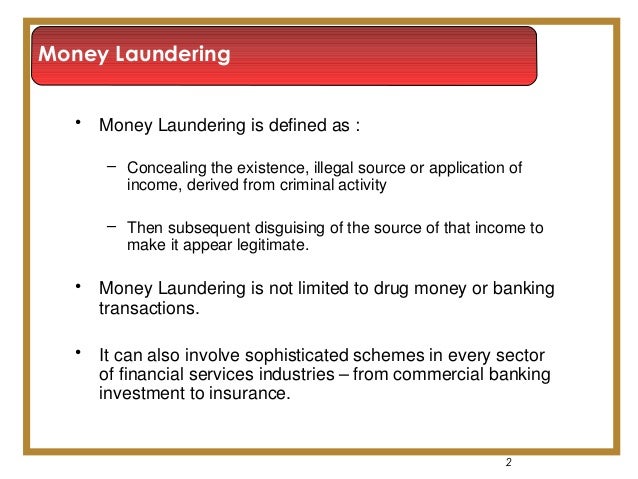 Source: slideshare.net
Source: slideshare.net
Criminals use money laundering to conceal their crimes and the money derived from them. By its very nature money laundering is an illegal activity carried out by criminals which occurs outside of the normal range of economic and financial statistics. Anti-Money Laundering Any law or regulation requiring an institution to perform due diligence on potential clients to ensure that it is not aiding in a money laundering scheme. Anti-money laundering AML refers to the activities financial institutions perform to achieve compliance with legal requirements to actively monitor for and report suspicious activities. It is usually perpetrated for the purpose of financing terrorism but can be also used by criminal organizations that have invested in legal businesses and would like to withdraw legitimate funds from official circulation.
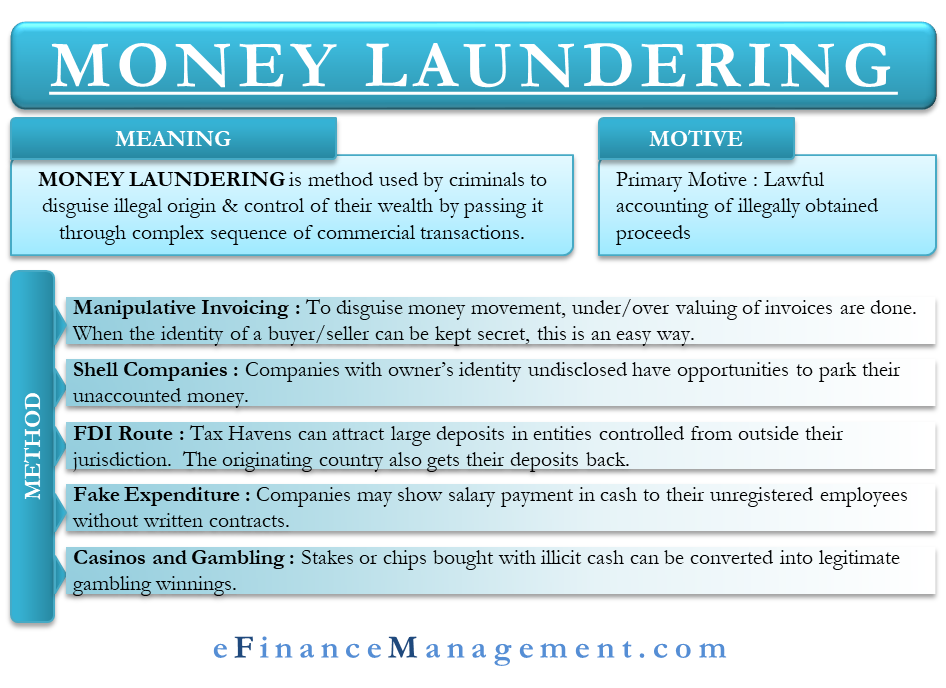 Source: efinancemanagement.com
Source: efinancemanagement.com
Anti-Money Laundering Any law or regulation requiring an institution to perform due diligence on potential clients to ensure that it is not aiding in a money laundering scheme. Anti-money laundering AML refers to the activities financial institutions perform to achieve compliance with legal requirements to actively monitor for and report suspicious activities. Initially AML laws were implemented only on financial institutions to control drug trafficking. Typically it involves three steps. Anti-money laundering refers to a set of rules and regulations that have been implemented to validate transactions and identification.
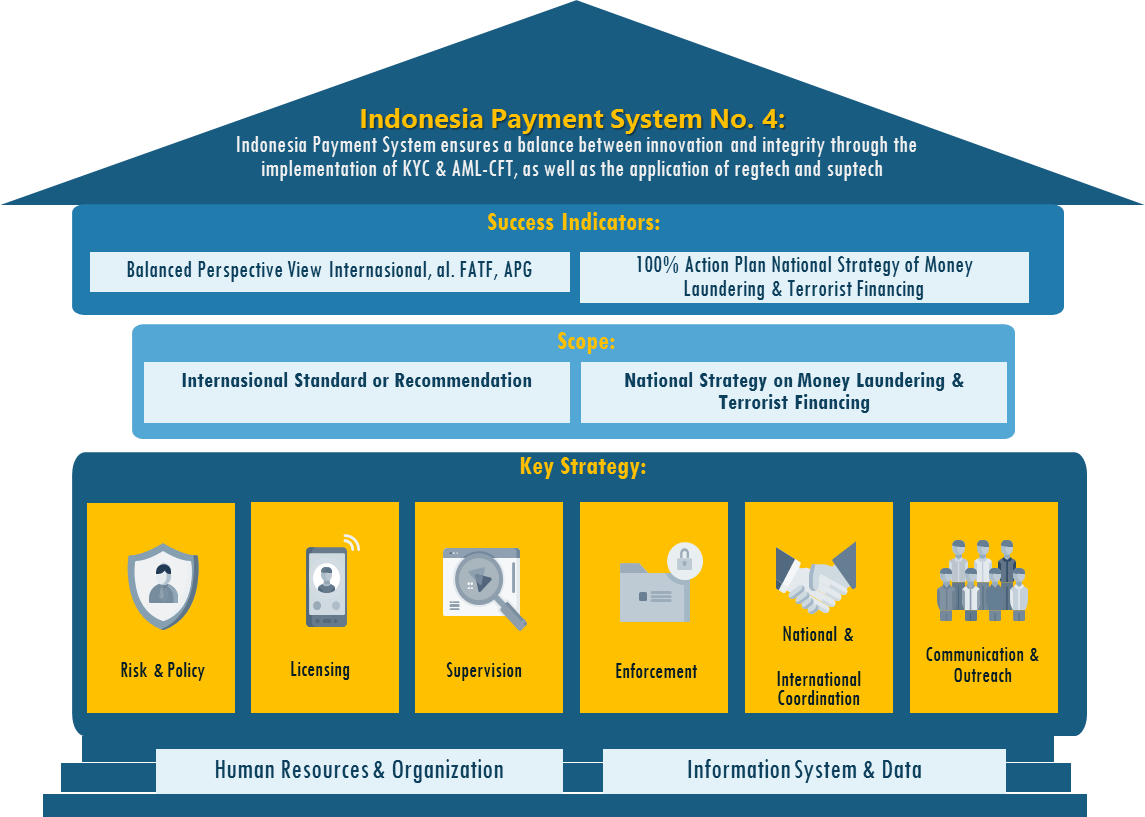 Source: bi.go.id
Source: bi.go.id
Along with some other aspects of underground economic activity rough estimates have been. Anti-money laundering includes all the laws regulations and policies to prevent money laundering and financial crime. Although you as a company stick to the rules this does not mean that your partners and business associates adhere to the same AML compliance laws as you. Anti-money laundering regulations are the rules for businesses institutions and even countries to eliminate money laundering and terrorist financing activities. Effective anti-money laundering and combating the financing of terrorism regimes are essential to protect the integrity of markets and of the global financial framework as they help mitigate the factors that facilitate financial abuse Min Zhu Deputy Managing Director of the IMF.
This site is an open community for users to share their favorite wallpapers on the internet, all images or pictures in this website are for personal wallpaper use only, it is stricly prohibited to use this wallpaper for commercial purposes, if you are the author and find this image is shared without your permission, please kindly raise a DMCA report to Us.
If you find this site convienient, please support us by sharing this posts to your own social media accounts like Facebook, Instagram and so on or you can also save this blog page with the title meaning of anti money laundering by using Ctrl + D for devices a laptop with a Windows operating system or Command + D for laptops with an Apple operating system. If you use a smartphone, you can also use the drawer menu of the browser you are using. Whether it’s a Windows, Mac, iOS or Android operating system, you will still be able to bookmark this website.